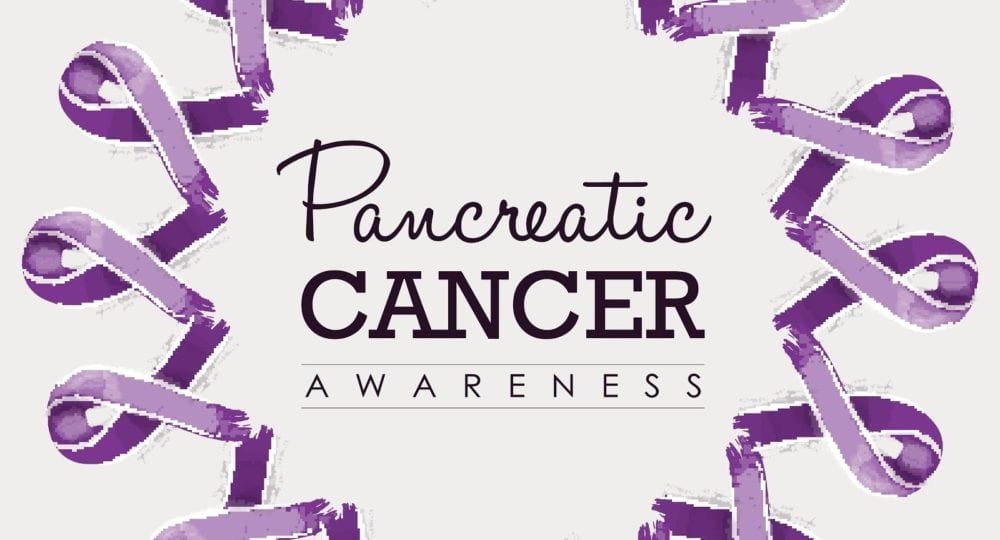November is Pancreatic Cancer Awareness Month and a time to ask yourself … how much do I know about Pancreatic cancer? Pancreatic cancer is often found when it has already progressed into late stage disease, however, educating yourself on the signs, symptoms and risk factors could save your life.
Risk Factors for Pancreatic Cancer:
- Family History – risk increases if multiple first degree relatives had the disease or if any were diagnosed under 50.
- Diet – a diet high in red and processed meats may increase risk, however, a diet high in fruits and vegetables may decrease risk.
- Obesity – increases your risk by 20% compared to those at a normal body weight.
- Race – African Americans and Ashkenazi Jews have a higher incidence.
- Smoking – may cause 20-30% of all exocrine pancreatic cancers.
- Gender – men have a slightly higher incidence of pancreatic cancer than women
- Age – risk of developing pancreatic cancer increases with age
- Diabetes – long standing history of diabetes (>5 years) increases risk
- Pancreatitis – chronic inflammation of the pancreas increases risk
Signs and Symptoms of Pancreatic Cancer:
- Abdominal or back pain
- Abdominal bloating/ascites
- Weight loss
- Jaundice (yellowing of the skin and/or eyes) with or without itching
- Loss of appetite
- Nausea/vomiting
- Change in stool
- Blood clots
- Pancreatitis
- Recent onset of Diabetes
- Overproduction of hormones (in neuroendocrine tumors of the pancreas)
Early Detection:
Presently there is no way to detect pancreatic cancer early. Since the pancreas lies deep in the abdomen it is difficult for doctors to see and feel the tumor during a physical exam. Signs and symptoms are not always obvious and can develop and change over time. There are also no specific lab tests that can symbolize to the doctor that you may have a pancreatic tumor for them to catch the disease early.
Diagnosis of Pancreatic Cancer:
If your physician suspects you may have a pancreatic cancer, you will more than likely have one or several of the following imaging studies:
- Computed Tomography (CT) Scan
- Magnetic Resonance Imaging (MRI)
- Positron Emission Tomography (PET) Scan
- Endoscopic Ultrasound (EUS)
- Endoscopic Retrograde Cholangiopancreatography (ERCP)
Blood Tests/Tumor Markers:
There are no blood tests that can detect pancreatic cancer, however, your bilirubin and liver enzymes may be evaluated and if they are elevated it could mean that the bile duct is blocked and elevated levels may signify to the physician to look for pancreatic cancer.
After diagnosis, the two blood tests below are sometimes ordered to monitor whether the tumor is growing or staying the same and how the patient is responding to treatment. Some pancreatic cells release these substances into the body but these tests are not used to diagnose pancreatic cancer because not all pancreatic cells release these antigens.
- CA 19-9 (Carbohydrate Antigen)
- CEA (Carcinoembryonic Antigen)
Tests that can help diagnose pancreatic neuroendocrine tumors are:
- Chromogranin A (cgA) – a molecule that is high in most people that have pancreatic neuroendocrine tumors.
- Pancreatic polypeptide (PP) – a hormone that is often elevated in people with pancreatic neuroendocrine tumors.
Pancreatic cancer awareness month is important so people can educate themselves on this disease and consider donating to a good cause if they are able. Researchers continue to work hard on ways to improve the diagnosis and treatment of pancreatic cancer so it can be caught early while it is still treatable. With your donations to cancer research or the pancreatic cancer awareness organizations, this work can continue.





